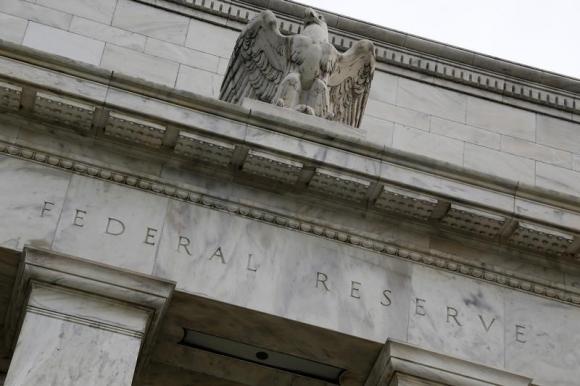
An eagle tops the U.S. Federal Reserve building's facade in Washington, July 31, 2013.
CREDIT: REUTERS/JONATHAN ERNST
(Reuters) - The Federal Reserve is welcoming the sharp drop in global energy prices, with two influential policymakers on Monday cheering the boost it should provide American pocketbooks and shrugging off any pressure on already low inflation.
Soft oil prices in particular, which hit a five-year low on Friday, will only temporarily dampen overall U.S. prices, Fed Vice Chairman Stanley Fischer and New York Fed President William Dudley said at separate events. The pair painted a mostly rosy outlook for the world's largest economy, suggesting the central bank is not letting energy markets distract it from lifting rates some time next year.
The lower inflation that we'll get from the lower price of oil is going to be temporary, Fischer said at the Council on Foreign Relations. I wouldn't worry about that very much because that period of negative, low inflation is actually happening as a result of a phenomenon that's making everyone better off, and furthermore likely to increase GDP rather than reduce it.
Dudley, who like Fischer is a close ally of Fed Chair Janet Yellen, said the oil rout was a positive for the economy because much of the extra money will be spent, not saved by Americans. The global price drop will also encourage more monetary easing by other central banks, spurring global growth, he said.
If the oil price drop were to intensify and persist, this would have negative implications for oil and gas investment in the United States, he added. Nevertheless, there are several reasons why I don't think this risk should be overstated, especially if oil prices stabilize around current levels.
Crude markets rebounded on Monday but have fallen the last five straight months, the longest losing streak since the crisis that brought on the deep recession. Measures of inflation, which have lingered below the Fed's 2 percent target for more than three years, have recently softened, raising questions over the timing of policy tightening.
I remain confident, despite the recent softening, that inflation will begin to move up towards our 2 percent objective next year, Dudley said at Baruch College. In a television interview later, he downplayed worries over leverage in oil and gas exploration.
Elsewhere in New York, Fischer said the United States may be on the verge of a long-awaited jump in wages that could signal the labor market has begun to heal more fully. I think that has a significant chance of being about to happen, he said.
U.S. wages have stagnated despite falling unemployment and decent gross domestic product (GDP) growth, so the Fed is only cautiously preparing to raise rates. It halted a bond-buying program in October.
Dudley, who repeated it is reasonable to expect a rate hike in mid-2015, said the Fed will not just tighten policy based on how the economy is faring but also on how well financial markets respond to the eventual hikes. More aggressive rate rises will be needed if financial markets do not react as expected, and vice versa, he said.
Elsewhere, the dovish head of the Minneapolis Fed, Narayana Kocherlakota, in a paper called on the central bank to rewrite its 2 percent inflation goal to reflect the view that below-target inflation is just as costly as above-target inflation.
Asked about raising that target, Fischer rejected the idea.